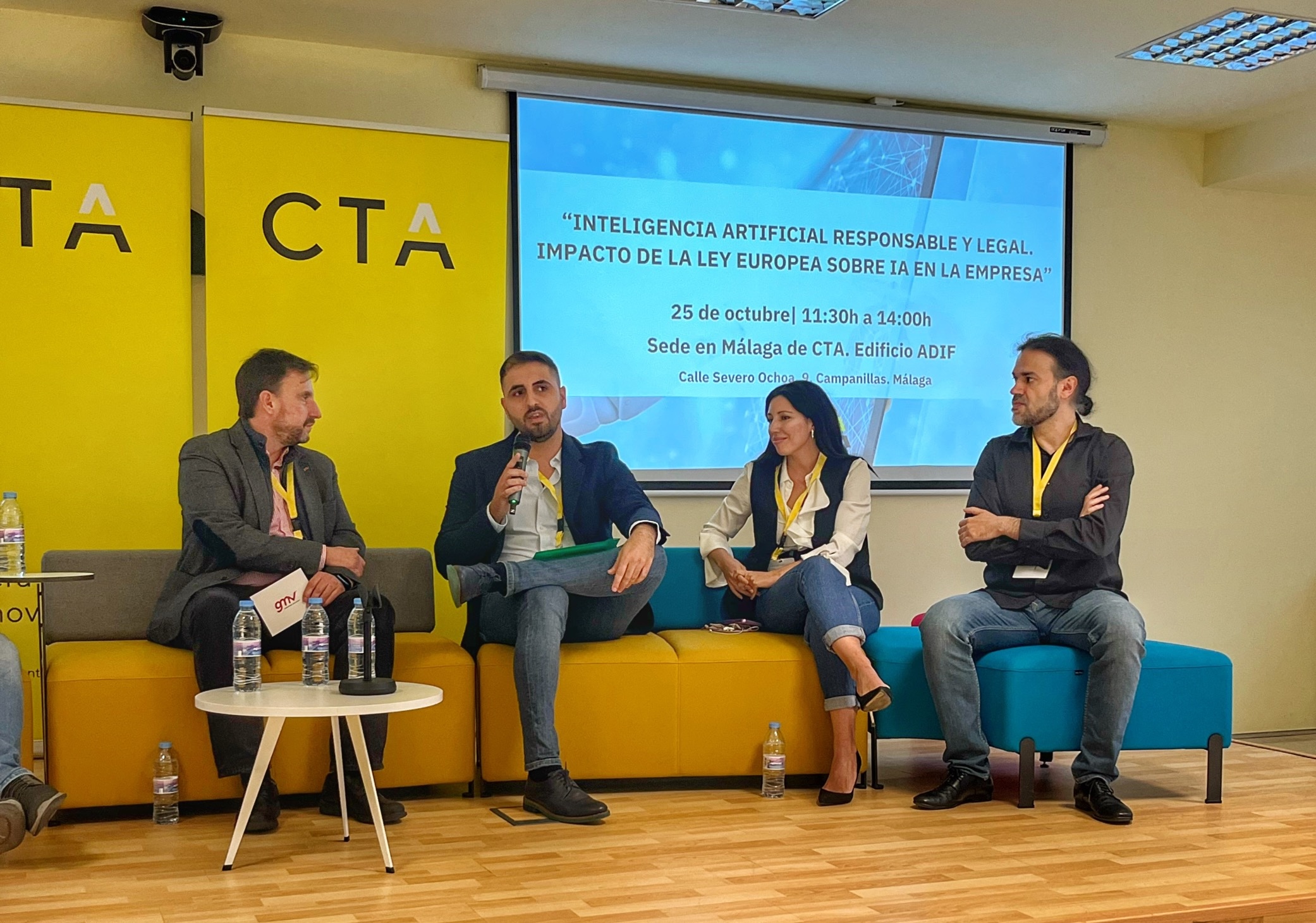On October 25, 2023, I had the honor of participating in the round table organized by the Corporación Tecnológica de Andalucía (CTA), under the title “Inteligencia artificial responsable y legal. Impacto de la ley europea sobre IA en la empresa”. This technical conference brought together professionals and thought leaders from the AI and business landscape, including representatives from Cibernos, Fundación Progreso y Salud, GMV, Vodafone, and Innovasur.

Me speaking at CTA's round table: "Responsible and Legal Artificial Intelligence"
Framing the topic
The session focused on the transformative impact of the EU AI Act and how it is shaping the landscape of artificial intelligence in Europe. I shared our perspective from Innovasur, where we approach AI development through a dual strategic lens: cybersecurity and smart cities.
My intervention revolved around the core pillars of responsibility and transparency, emphasizing that:
- The power of AI, especially in sensitive sectors like healthcare or energy, requires an inherent sense of responsibility.
- At Innovasur, we prioritize ethics and trust in every step of our work, acknowledging the sensitive nature of the information we handle.
Key takeaways from my intervention
🌍 The impact of the EU AI Act
The legislation introduces a risk-based classification system that directly affects use cases such as biometric identification. We are proactively adapting our internal protocols to align with the regulatory obligations, including design-phase ethical considerations.
👥 People first: Our team’s legal and ethical awareness
AI is not only about data and models, but also about human decision-making. Our teams receive ongoing training in both technical excellence and regulatory awareness, including legal and ethical comprehension of AI development.
⚖️ From flexible to responsible AI
Flexibility is a core asset of AI — but without regulatory alignment, it may become a liability. We incorporate ethics and legal constraints as early as the requirement-gathering phase of each project.
✅ Our mechanisms for responsible AI
We shared some concrete measures we’ve implemented at Innovasur:
- Dataset audits: We examine source, bias, and diversity early on.
- Exploratory data analysis (EDA) in development phase: We detect social biases relevant to the specific use case.
- Addressing the black-box nature of AI models: We strive to integrate interpretability layers to make results comprehensible and accountable.
Regulation as a driver of innovation
In the final part of my contribution, I reflected on the conceptual map that links regulation, innovation, and technological advancement:
- While regulation may initially appear as a barrier, it can catalyze better practices.
- The EU AI Act encourages companies to:
- Validate their work within a normative framework.
- Adopt objective, traceable, and fair data practices.
- Create AI solutions that are more robust and socially aligned.
Final thoughts
I closed my intervention by affirming that:
“The true potential of AI is only realized when we balance innovation with responsibility.”
I fully support the EU’s initiative to regulate AI — not as a restriction, but as a guideline towards a safer and more human-centered future.
Thanks again to CTA and my fellow panelists:
- Asterio González (Cibernos)
- Carlos Loucera Muñecas (Fundación Progreso y Salud)
- José Carlos Baquero Triguero (GMV)
- Yasmina Carrascal Orozco (Vodafone)
- Isabel Hormigo (CTA)

Panel discussion announcement
📍 Location: Calle Severo Ochoa 9, Campanillas, Málaga
📅 Date: October 25th, 2023
🎤 Event: Inteligencia artificial responsable y legal. Impacto de la ley europea sobre IA en la empresa.
🎯 Hosted by: Corporación Tecnológica de Andalucía (CTA)
📸 Image credits: Corporación Tecnológica de Andalucía (CTA)

